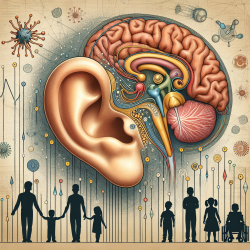Auditory neuropathy (AN) is a unique and complex type of hearing impairment that affects the transmission of sound from the inner ear to the brain. As a practitioner in the field of speech-language pathology, understanding the genetic underpinnings of AN can significantly enhance your ability to provide targeted and effective interventions. The recent study titled Clinical and genetic architecture of a large cohort with auditory neuropathy offers valuable insights into the genetic factors contributing to AN, which can be leveraged to improve clinical outcomes for children.
In this comprehensive study, researchers analyzed a cohort of 311 patients diagnosed with AN, identifying pathogenic and likely pathogenic variants in 23 genes. Notably, the study found that the genetic distribution of AN differs significantly from other forms of sensorineural hearing loss, with the OTOF and AIFM1 genes being the most commonly affected. The study's findings have several practical implications for clinicians:
- Enhanced Diagnostic Accuracy: The identification of specific genetic variants associated with AN can improve the accuracy of diagnoses. Genetic testing should be considered as part of the diagnostic process, especially for patients with a family history of hearing loss or those presenting with atypical symptoms.
- Personalized Treatment Plans: Understanding the genetic basis of AN allows for more personalized treatment plans. For instance, patients with OTOF mutations may benefit significantly from cochlear implants, whereas those with AIFM1 mutations might require different management strategies due to the gene's involvement in mitochondrial function.
- Prognostic Insights: Genetic information can provide prognostic insights, helping clinicians predict the likely progression of hearing loss and tailor interventions accordingly. For example, the study found that OTOF mutations are predominantly identified in infants, which can inform early intervention strategies.
- Family Counseling: Genetic counseling can be offered to families to help them understand the hereditary nature of AN, the risks of recurrence in future offspring, and the implications for other family members.
To further enhance your practice, consider the following actions based on the study's outcomes:
- Integrate Genetic Testing: Advocate for the inclusion of genetic testing in the standard diagnostic protocol for AN. This can help identify the underlying genetic causes and inform more effective treatment plans.
- Stay Informed: Keep abreast of the latest research in genetic hearing loss to continuously update your knowledge and clinical practices. Participating in professional development opportunities and attending relevant conferences can be beneficial.
- Collaborate with Geneticists: Work closely with geneticists and other specialists to interpret genetic test results and develop comprehensive care plans for your patients.
- Educate Families: Provide educational resources and support to families affected by AN, helping them navigate the complexities of genetic testing and understand the implications for their child's hearing health.
In conclusion, the findings from the study Clinical and genetic architecture of a large cohort with auditory neuropathy underscore the importance of genetic factors in understanding and managing AN. By integrating these insights into your practice, you can enhance diagnostic accuracy, personalize treatment plans, and ultimately improve outcomes for children with AN.
To read the original research paper, please follow this link: Clinical and genetic architecture of a large cohort with auditory neuropathy.










